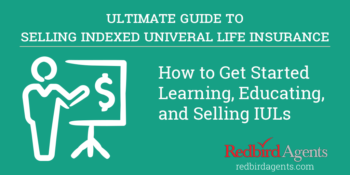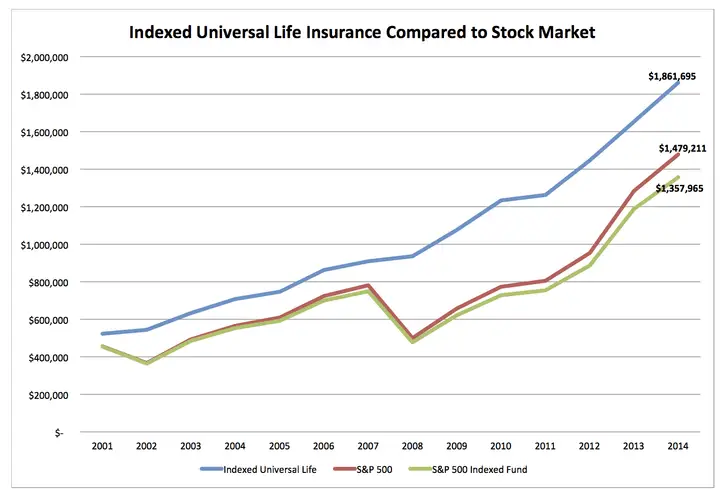All Categories
Featured
Table of Contents
1), commonly in an attempt to beat their category standards. This is a straw male disagreement, and one IUL individuals like to make. Do they contrast the IUL to something like the Lead Overall Securities Market Fund Admiral Show to no load, an expense proportion (ER) of 5 basis factors, a turnover proportion of 4.3%, and an extraordinary tax-efficient document of distributions? No, they compare it to some terrible actively taken care of fund with an 8% lots, a 2% ER, an 80% turn over proportion, and a horrible record of short-term resources gain distributions.
Shared funds often make yearly taxed circulations to fund proprietors, also when the worth of their fund has decreased in worth. Common funds not just need income coverage (and the resulting yearly tax) when the shared fund is going up in worth, but can additionally impose revenue taxes in a year when the fund has gone down in value.
That's not exactly how common funds function. You can tax-manage the fund, harvesting losses and gains in order to reduce taxed circulations to the investors, however that isn't somehow mosting likely to transform the reported return of the fund. Just Bernie Madoff kinds can do that. IULs stay clear of myriad tax obligation catches. The ownership of mutual funds might require the mutual fund owner to pay approximated tax obligations.

IULs are easy to position to make sure that, at the owner's fatality, the recipient is not subject to either earnings or inheritance tax. The same tax decrease techniques do not work virtually as well with common funds. There are numerous, typically expensive, tax catches related to the timed buying and marketing of common fund shares, catches that do not relate to indexed life Insurance.
Opportunities aren't really high that you're mosting likely to be subject to the AMT due to your mutual fund distributions if you aren't without them. The remainder of this one is half-truths at best. While it is true that there is no earnings tax obligation due to your beneficiaries when they acquire the profits of your IUL plan, it is likewise true that there is no revenue tax due to your heirs when they inherit a shared fund in a taxed account from you.
Iul Death Benefit
There are much better means to prevent estate tax obligation issues than purchasing financial investments with reduced returns. Mutual funds might cause revenue taxation of Social Security benefits.

The development within the IUL is tax-deferred and may be taken as free of tax income by means of finances. The policy owner (vs. the shared fund manager) is in control of his or her reportable revenue, thus enabling them to minimize and even eliminate the tax of their Social Security benefits. This is wonderful.
Below's an additional minimal concern. It's real if you acquire a mutual fund for say $10 per share just before the circulation day, and it distributes a $0.50 distribution, you are then going to owe taxes (possibly 7-10 cents per share) although that you haven't yet had any type of gains.
In the end, it's actually regarding the after-tax return, not exactly how much you pay in tax obligations. You are mosting likely to pay even more in taxes by utilizing a taxed account than if you purchase life insurance policy. However you're also most likely mosting likely to have more money after paying those tax obligations. The record-keeping demands for possessing mutual funds are dramatically much more complex.
With an IUL, one's records are maintained by the insurance provider, duplicates of yearly statements are mailed to the owner, and distributions (if any) are completed and reported at year end. This set is likewise kind of silly. Of program you should maintain your tax documents in case of an audit.
Iul Vs Term Life
Rarely a reason to get life insurance coverage. Shared funds are frequently part of a decedent's probated estate.
Additionally, they are subject to the hold-ups and expenses of probate. The profits of the IUL plan, on the various other hand, is constantly a non-probate distribution that passes outside of probate directly to one's called recipients, and is for that reason exempt to one's posthumous financial institutions, unwanted public disclosure, or similar delays and costs.
Medicaid disqualification and lifetime earnings. An IUL can offer their owners with a stream of earnings for their whole lifetime, regardless of how lengthy they live.

This is beneficial when organizing one's events, and converting possessions to revenue before an assisted living facility confinement. Mutual funds can not be transformed in a similar way, and are usually considered countable Medicaid possessions. This is another foolish one advocating that bad people (you recognize, the ones who need Medicaid, a federal government program for the bad, to spend for their assisted living facility) ought to use IUL rather than mutual funds.
Best Iul Policies
And life insurance coverage looks awful when contrasted fairly against a retirement account. Second, people who have cash to get IUL over and past their retirement accounts are going to need to be dreadful at managing money in order to ever qualify for Medicaid to pay for their assisted living home prices.
Persistent and incurable disease motorcyclist. All policies will enable an owner's simple accessibility to money from their policy, frequently waiving any type of abandonment charges when such people endure a major disease, require at-home treatment, or become restricted to a nursing home. Common funds do not provide a comparable waiver when contingent deferred sales fees still use to a mutual fund account whose owner needs to offer some shares to money the prices of such a remain.
Universal Whole
You get to pay more for that benefit (biker) with an insurance coverage policy. Indexed universal life insurance coverage supplies fatality benefits to the beneficiaries of the IUL owners, and neither the proprietor neither the recipient can ever before lose money due to a down market.
Now, ask yourself, do you really require or desire a survivor benefit? I absolutely do not require one after I get to economic freedom. Do I desire one? I intend if it were affordable sufficient. Obviously, it isn't affordable. Typically, a purchaser of life insurance policy spends for real cost of the life insurance policy benefit, plus the prices of the policy, plus the revenues of the insurer.
Aig Index Universal Life Insurance
I'm not totally sure why Mr. Morais tossed in the entire "you can't lose money" again right here as it was covered fairly well in # 1. He just desired to repeat the ideal selling factor for these things I expect. Once again, you do not lose nominal bucks, yet you can lose genuine bucks, in addition to face major possibility expense as a result of low returns.

An indexed global life insurance policy policy owner may trade their policy for a totally various policy without setting off income taxes. A common fund proprietor can stagnate funds from one mutual fund business to another without offering his shares at the former (thus setting off a taxed occasion), and buying new shares at the latter, commonly based on sales fees at both.
While it is true that you can trade one insurance coverage policy for another, the factor that people do this is that the first one is such a terrible policy that even after buying a brand-new one and undergoing the early, adverse return years, you'll still appear in advance. If they were marketed the appropriate policy the very first time, they shouldn't have any desire to ever before exchange it and undergo the early, adverse return years once more.
Latest Posts
Mortality Charge For Universal Life Policies
Indexation Insurance
Iul Explained